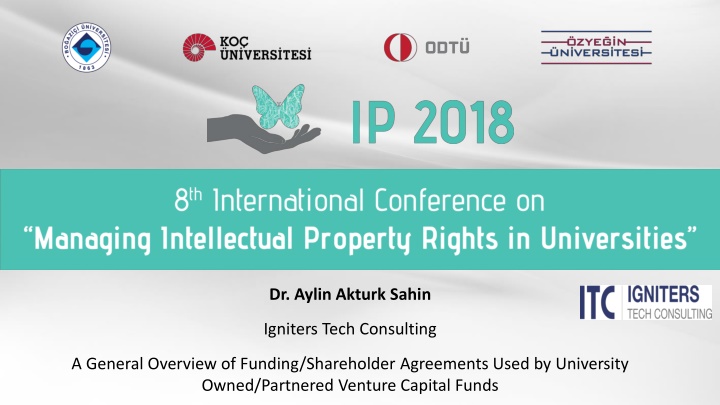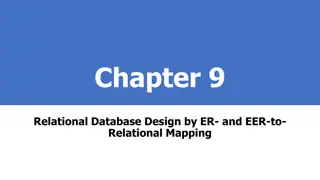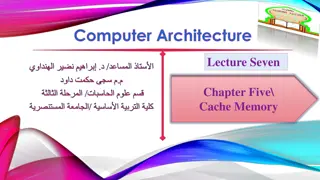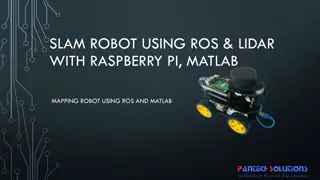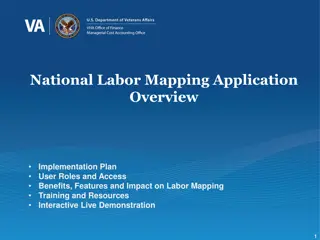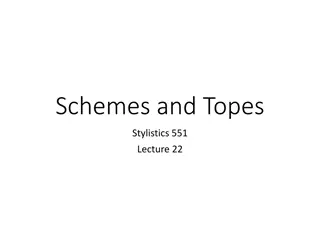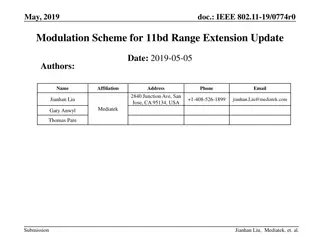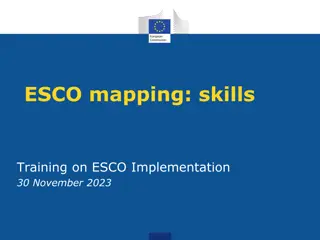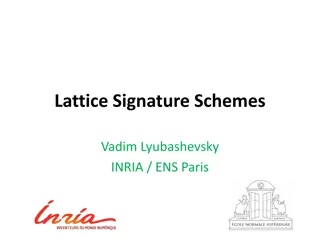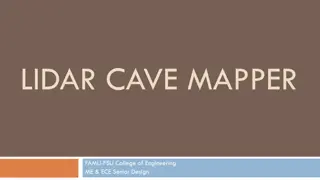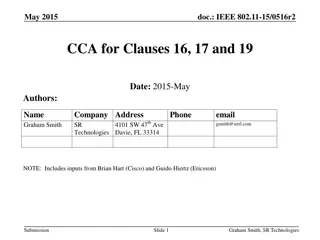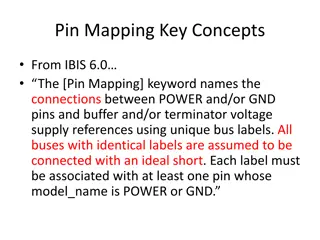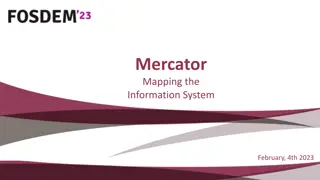Different Mapping Schemes Presentation for DSN Group Meeting
This presentation covers various mapping schemes including Page-Level Mapping Scheme, Demand-based Flash Translation Layer (DFTL), Convertible Flash Translation Layer (CFTL), Block-Level Mapping Scheme, and Hybrid-Level Mapping Scheme. It delves into specifics like managing NAND flash memory, benefits, disadvantages, and architectures of different schemes. Presented by Reza Faridmoayer under the supervision of Dr. Asadi at Sharif University of Technology in 2011.
Download Presentation

Please find below an Image/Link to download the presentation.
The content on the website is provided AS IS for your information and personal use only. It may not be sold, licensed, or shared on other websites without obtaining consent from the author.If you encounter any issues during the download, it is possible that the publisher has removed the file from their server.
You are allowed to download the files provided on this website for personal or commercial use, subject to the condition that they are used lawfully. All files are the property of their respective owners.
The content on the website is provided AS IS for your information and personal use only. It may not be sold, licensed, or shared on other websites without obtaining consent from the author.
E N D
Presentation Transcript
Dr. Aylin Akturk Sahin Kurum Logo Igniters Tech Consulting A General Overview of Funding/Shareholder Agreements Used by University Owned/Partnered Venture Capital Funds
These materials have been prepared solely for educational purposes. The presentation of these materials does not constitute legal advice, nor does it establish any form of attorney-client relationship with the author. Specific legal issues should be addressed through consultation with your own counsel, not by reliance on this presentation or these materials. Any tax advice included in this presentation was not intended or written to be used, and it cannot be used by the taxpayer, for the purpose of (i) avoiding penalties under the Internal Revenue Code or (ii) promoting, marketing or recommending to another party any transaction or matter addressed herein.
SUBJECTS TO BE COVERED: 1) OVERVIEW OF UC BERKELEY S SKYDECK FUND AND MIDDLE EAST TECHNICAL UNIVERSITY (ODTU) S INVESTMENT FUND 2) SIMPLE AGREEMENT FOR FUTURE EQUITY (SAFE) 3) CONVERTIBLE NOTES 4) EQUITY FINANCING AGREEMENTS 5) CLAUSES RELATED TO IP
SKYDECK FUND: which produce the most venture capital-backed entrepreneurs in the USA. In 2011 Berkeley has launched a startup accelerator program called SkyDeck that is a JV between College of Engineering and the Business School. In 2012 SkyDeck Fund was established. In just 6 six years, SkyDeck Fund invested in 200 technology startups and has 6 exits so far. This year SkyDeck Fund has started to invest in startups participating at Accelerator Program. Participating companies receive 100,000 USD in the form of a SAFE UC Berkeley is ranked number 2 among the 50 undergraduate programs
ODTU INVESTMENT FUND: Accelerator Program. ODTU also invests in non participating startups through application. ODTU uses SAFE and convertible notes as a fast and easy way of investing. Program participating companies and non participating companies receive amounts raging from 10,000 USD to hundreds of thousand Dollars depending In their stage. ODTU invests in early stage tech startups that participate at Growth Circuit
SIMPLE AGREEMENT FOR FUTURE EQUITY (SAFE): later financing event. Actual valuation is delayed until a Series A Financing Round Simple, fast and cheap to execute Even working with an attorney, legal costs are minimum SAFEs are not debt, so no maturity date, no deadline for repayment No interest rate Warranty that investment money will be converted to preferred shares at a
SAFE: What happens if there is no equity financing and the investment amount does not convert to shares? If there is no liquidity event, then the Investor shall wait. -Liquidity Event: IPO or change of control If there is liquidity event before a financing round, then Investor has 2 options -receive a cash payment equal to the Purchase Amount (Investment) OR -automatically receive from the Company a number of shares of Common Stock equal to the Purchase Amount divided by the Liquidity Price
SAFE: ie. SkyDeck SAFE s valuation cap is 2 M. By investing 100 K, SkyDeck locks in at least 5% equity in the next financing round IF ANY! Valuation Caps at early stage startups are anywhere between 1 M-8 M Investor gets all the preferred stock rights without negotiating tens of different terms of next round Startups are in a SAFE position as they are not obliged to pay back the investment unless there is a liquidity event Lock the ownership percentage by valuation cap!
CONVERTIBLE DEBT: DEBT Instruments Maturity date: usually between 1-2 years Interest rate Valuation cap + discount Investors may get their money back with interest on maturity date if they choose to or convert their money to preferred stock in the next round
PITFALLS OF SAFE AND CONVERTIBLE NOTES: For startups: Don t forget that you are giving away future equity back the investment unless there is a liquidity event For investors: Startups are in a SAFE position as they are not obliged to pay
PREFERRED STOCK PURCHASE AGREEMENTS (SHAREHOLDER AGREEMENTS) WHAT RIGHTS? 1) Liquidation preference: (ie. founders) When the company is sold or insolvent, early investors usually get 1X the investment amount plus unpaid dividends At bigger rounds investors get 2X or 3X the investment amount plus unpaid dividends Investors have liquidation preference over common stockholders
PREFERRED STOCK PURCHASE AGREEMENTS (SHAREHOLDER AGREEMENTS) WHAT RIGHTS? 2) Protective provisions: Investor approval is required alter the rights, powers or privileges of the Preferred Stock in a way that adversely affects the Preferred Stock 3) Information rights: Investors may get information about company financials whenever they deem necessary or in 3-6-12 month periods. ie. unaudited annual or quarterly financial statements 4) Board Seat: Usually at Series A rounds and later
5) Right of First Offer: Investor may purchase its pro rata percentage of issuance of new securities until an IPO 6) Drag Along: requires the investors and founders to vote in favor of deemed company acquisition if majority of common stock holders and preferred stockholders vote in favor. 7) ROFR and Co-Sale (Tag-Along Right) Prevents the founder to sell shares without investors are offered first to purchase the shares or participate in the sale of shares
IP CLAUSES SAFE-Convertible Notes: IP should be properly assigned to the Company before closing and the Founders should sign NDA/Tech Assignment Contracts for their work after investment. Equity Financing Contracts: Case by Case: ie. Investor may demand licensing rights regarding Company IP for a certain period of time
THANK YOU FOR YOUR TIME! HAPPY TO ANSWER ANY QUESTIONS ABOUT ANYTHING (EXCLUDING RELIGION AND POLITICS)
